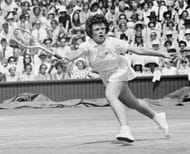In 1990, Life magazine named Billie Jean King among the "100 Most Important Americans of the 20th Century." She was the only female athlete on the list, and one of only four athletes. Babe Ruth, Jackie Robinson and Muhammad Ali were the others. In absolute terms, there have definitely been greater individual performers than Billie Jean, but few have single-handedly carried the flame of equality, when it came to the matter of women and sports.
Sport, in its bare form, is an art that has got everything to do with skill and nothing to do with the gender that is performing it. However, over the years, male chauvinism, as its ugly, irritatingly persistent and dark opponent, has always found a way to undermine this idea. The fairer sex has had its unnecessary share of controversies, not only over its sporting achievements, but also for the legitimacy of these achievements.
This is specifically why personalities like Billie Jean King, with a desire for struggle, not just for themselves, but for the society tower over mere athletes. We accept that men are physically stronger than women, in general. But that does not mean they are necessarily adept and better than women.
In track and field, badminton, tennis, squash, swimming, diving, gymnastics and football, women are equally appealing to watch if not more sometimes. Justine Henin’s single handed backhand was an epitome of art and power, considered by many as the greatest single-handed backhand in tennis, male or female. Yelena Isinbayeva was no less dominating and appealing with the pole vault than Sergei Bubka.
Watching a professional sport is not a human rights issue. People like what they like, spend their money on what they are attracted to. However, we can in no means, deride a gender of acceptance, only because they are not meant to compete in an activity, that has been perceived to be “for males” for a greater part of human existence.
In a society dominated by males, Billie Jean invigorated the lens which compelled us to think and accept that women also deserve an equal share of the pie. A Grand Slam champion in tennis today receives the same paycheck, irrespective of the gender. And this is where we, as a society owe so much to luminaries like Billie Jean , who fought so much selflessly for practically the better half of humanity.
Deep-rooted social context
Back home, in India, we have also had our own struggles. Time and again, despite giving their best for the nation, a Sania Mirza, or a Mary Kom has had to fight for their rights and prove their patriotism.
As a nation we owe as much as to Dhyan Chand as much as we do to Mary Kom, as much as to Vishy Anand as Saina Nehwal, as much as to Sachin as Anju Bobby George. For as sportsmen, they compete, sacrifice their lives for their chosen passion and we, have no right to demean their chosen path of life, and more so when they are playing for their nation. Because irrespective of the gender, the winner takes the gold.
Excellence looks beyond the myopic vision of gender, and thankfully, the India of today is slowly recognizing its daughters, as it has been doing to its sons.
Sportswomen in Assam
If we look back at our own state, Assam, and try to force ourselves to remember sportswomen worthy enough to be asked as a quiz question, we cannot go beyond perhaps two names: Tayabun Nissa in discuss throw and Monalisa Baruah in table tennis. The reason for this paucity in female sporting talent has a deep-rooted social context.
The Assam of today is by no means less progressive than the India of today. Nor is it a region lacking talent. Women in Assam are often not assigned traditional roles early and there are no significant restrictions against playing sport. Manipur, not very far from Assam, gives India more than half of its women’s football team, gave India one of its all-time hockey greats in Suraj Lata Devi, not to mention its contribution in women’s boxing. Yes, it also gave us Mary Kom. So if Manipur can, why cannot Assam?
Yes, it can. But for this to happen, we, the people of this wonderful state, as a collective conscious group, must accept the fact that sport is also a significant, more importantly an acceptable form of education. The India of today is slowly making it sustainably employable.
We should not force our daughters to memorize the parts of the digestive system if she is more drawn towards the different openings in chess. Not everyone is meant to become a doctor or an engineer, only those who want to, should be encouraged. They do not need to memorize history books because left on their own, they may just go on to create their own chapters of history.
Parents, and the broader society thus collectively play a critical role in letting the child evolve in her chosen path. Personalities like Billie Jean King led the path like a crusader fighting a battle for all of us, using sports as a means to create social change. It is our responsibility to keep the dice rolling, and Assam is in no way short of the talent needed to keep the flame burning bright.
The girl next door could be the girl we can all be proud of. Given the right opportunities, she could create her own identity through sports, and be the flag bearer of our hopes.

